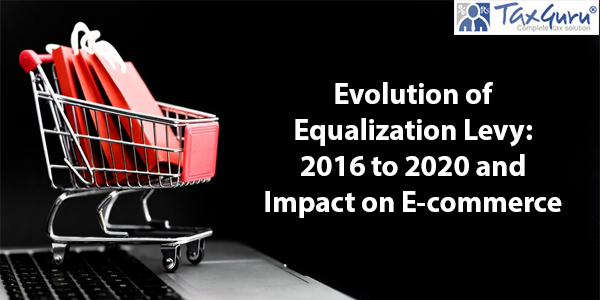Introduction: The Equalization Levy, introduced by the Finance Act, 2016, aimed to address tax challenges arising from digital transactions. This article delves into the evolution of the levy, focusing on the amendments introduced in 2020, particularly in the context of e-commerce operators.
Here we will discuss about the equalization levy initially levied by Finance Act, 2016 and recent amendments introduced by Finance Act, 2020:
In the light of tax challenges caused by growing number of digital transactions, Concept of Equalisation Levy was introduced in India by Finance Act, 2016 on certain non-resident businesses.
Due to this initiative by Government, Indian Business Residents are under an obligation to deduct such amount from the payments made to non-resident businesses, and now to e-commerce operators are too covered under the definition of non-residents businesses.
Wef 01.04.2020, equalization levy shall be applicable to e-commerce operators also. E-commerce operators means a non-resident that owns, operates or manages a digital or electronic facility or platform for the online sale of goods or the online provisions of services.
a. Classification of services where Equalization levy is applicable:
Finance Act 2016 applied the levy at the rate of 6% only on certain specified transactions such as on Online advertisements and any provision for digital advertising space or facilities/ service for the purpose of online advertisement;
Wef 01.04.2020, equalization levy @ 2% shall be applied on e-commerce supply or services and includes the following-
1. Online sales of goods owned by the e-commerce operators
2. Online provision of services provided by the e-commerce operators
3. Online sales of goods or provision of services or both facilitated by e-commerce operators
4. Any combination of the above.
b. Categorization of persons comes under the ambit of Equalization levy:
According to section 165 of Income Tax Act, 1961, the levy is applicable when consideration for specified services received or receivable by a person, being a non-resident from-
1. A person resident in India and carrying on business or profession or
2. A non-resident having permanent establishment in India
Wef 01.04.2020, equalization levy shall be charged @ 2% on e-commerce supplies and services made by e-commerce operators-
1. To a person resident in India
2. To a non-resident as-
a. Sale of advertisement, where targeted customers are Indian resident who access the advertisement through IP address located in India
b. Sale of data, collected from a person who is resident in India or from a person who uses IP address located in India
3. To a person who buys such goods or services or both using IP address located in India.
C. Equalization levy not applicable:
Section 165 talks about some conditions when equalization levy shall not be charged , where-
1. The non-resident has a permanent establishment in India and provided specified services are effectively connected with such permanent establishment.
2. Aggregate amount of consideration for specified services does not exceed one lakh rupees.

It is to be noted that wef 01.04.2020, following conditions has been inserted (governed by newly inserted sec. 165A) where equalization levy @ 2% shall not be charged-
1. Where e-commerce operator has a permanent establishment in India and provided e-commerce supplies are effectively connected with such permanent establishment.
2. Where equalization levy is leviable under section 165.
3. Where the total turnover of e-commerce operator is less than two crore rupees during the previous year.
d. Other Points:
It is the responsibility of payer for deducting TDS who is going to make the payment to the e-commerce operator for the services availed. However, the liability to pay equalisation levy lies with e-commerce operator itself. It is an extra charge levied on the non-resident e-commerce operator covering them to the ambit of Indian Tax Laws for this levy.
Hence, it can be interpreted that the TDS shall continue to be deducted u/s 195 or other sections as before based upon the deduction requirements under those sections.
Interest on delayed payment of tax would be charged @ 1 percent per month or part of the month.
Penalty for failure to furnish statements in Form-1 on or before 30 June: Rs 100 per day.
Impression of amendments introduced by Finance Act, 2020-
Google, Facebook, Amazon, Microsoft, Adobe, Netflix and other Apps has raised a strong concern that the new levy is highly discriminatory new tax on foreign companies. Also these companies which offer services to Indians through their overseas arms are expected to be impacted by the new 2% levy. Turnover of Rs. 2 Crores is a very low exemption threshold for these giants.
As equalisation levy is not a part of income tax, companies will also not get credit for it in their residence country or favourable treaty benefits.





